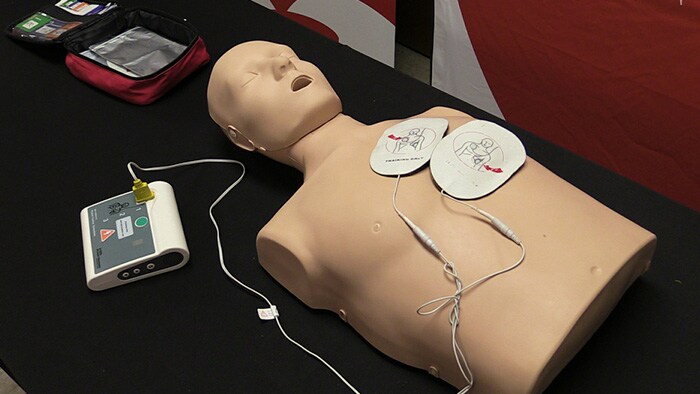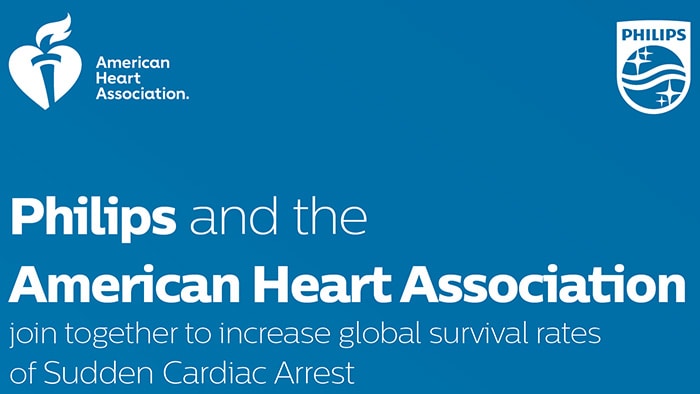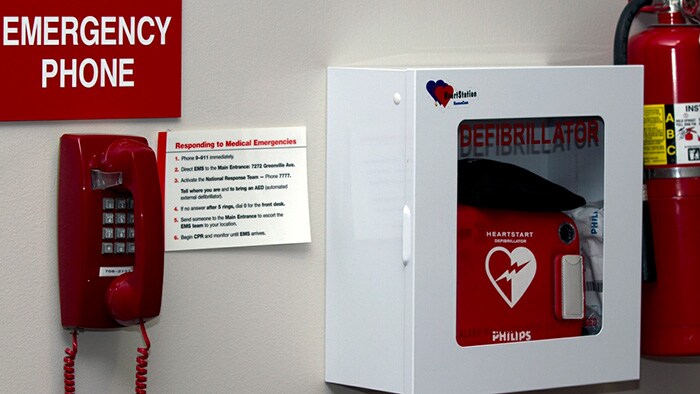January 23, 2019
Philips and the American Heart Association join together to increase global survival rates of Sudden Cardiac Arrest
The Philips and American Heart Association Connected Pulse Program first-of-a kind initiative, combines education, training and technology for an integrated customized solution in major metropolitan areas around the world
Amsterdam, the Netherlands and Dallas, Texas – Royal Philips (NYSE: PHG, AEX: PHIA), a global leader in health technology, and the American Heart Association, the world’s leading voluntary health organization devoted to a world of longer, healthier lives, today announced a collaboration to increase sudden cardiac arrest (SCA) survival rates in densely populated cities around the world. The Connected Pulse program leverages a unique end-to-end solution combining education programs to increase awareness of CPR, the use of publicly-available AEDs (Automated External Defibrillator), and new technologies to strengthen the ‘chain of survival’ from the moment an incident occurs to the patient reaching the hospital. Cardiovascular disease is a leading cause of global mortality, accounting for almost 17 million deaths annually – 31 percent of all deaths1. It is estimated that 70 to 80 percent of SCAs happen outside the hospital2. For every minute that passes without CPR and defibrillation, a SCA victim’s chance of survival decreases by seven to 10 percent3. These cardiac arrests can happen anywhere, at any time. With bystander intervention and treatment with an AED, the survival triples to 31.4 percent4. “Philips is dedicated to providing integrated cardiology solutions with a focus on prevention, diagnosis and treatment,” said Frans van Houten, CEO, Royal Philips and member of the American Heart Association CEO Roundtable, a leadership collaborative of 40-plus members who collectively represent more than 10 million employees and their family members to tackle the biggest workforce health challenges. “By joining with the American Heart Association to offer a large-scale, integrated suite of services and expertise, we have the opportunity to make a significant positive impact on the chances of survival from sudden cardiac arrests that occur outside of the hospital, especially in major cities with huge populations.” “This alliance marks the first time two major global organizations have come together to offer a worldwide, scalable solution to increase out-of-hospital sudden cardiac arrest survival rates,” said Nancy Brown, CEO of the American Heart Association. “When we educate everyone about the life-saving skill of CPR and make AEDs readily available, we increase the chance of survival for all people. Together with Philips, we’ve combined trusted science and innovative health technology to create a positive health impact in all communities around the world.” Connected Pulse: strengthening the chain of survival for sudden cardiac arrest By leveraging technology to better connect victims and rescuers – both professional and lay responders – the Connected Pulse program helps optimize improved outcomes within the four critical steps of the chain of survival: 1) alerting emergency medical services; 2) giving CPR to the patient; 3) delivering treatment using an AED; and 4) advanced critical life support, provided by the emergency medical services. Training and awareness programs increase the likelihood of a lay responder being on-hand to provide CPR and treatment using an AED. In addition to the AEDs themselves, technology applications including mapping AEDs and automated alerting of nearby lay responders have the potential to significantly strengthen the chain of survival and increase survival rates. Components of the customized end-to-end solution from Philips and the American Heart Association will include: Philips and the AHA expect to announce the first pilot cities participating in the program in 2019. To learn more about the Connected Pulse program, visit www.connectedpulse.org. 1World Health Organization - https://www.who.int/news-room/fact-sheets/detail/cardiovascular-diseases-(cvds) 2Cardiac Arrest vs Heart Attack, American Heart Association, September 16, 2016 3AHA Releases 2015 Heart and Stroke Statistics, Sudden Cardiac Arrest Foundation, September 16, 2016 4Response to Cardiac Arrest and Selected Life-Threatening Medical Emergencies, Mary Fran Hazinski; et al, American Heart Association, September 16, 2016 5https://www.resuscitationjournal.com/article/S0300-9572(17)30297-6/pdf
Connected Pulse: strengthening the chain of survival for sudden cardiac arrest
By leveraging technology to better connect victims and rescuers – both professional and lay responders – the Connected Pulse program helps optimize improved outcomes within the four critical steps of the chain of survival: 1) alerting emergency medical services; 2) giving CPR to the patient; 3) delivering treatment using an AED; and 4) advanced critical life support, provided by the emergency medical services. Training and awareness programs increase the likelihood of a lay responder being on-hand to provide CPR and treatment using an AED. In addition to the AEDs themselves, technology applications including mapping AEDs and automated alerting of nearby lay responders have the potential to significantly strengthen the chain of survival and increase survival rates. Components of the customized end-to-end solution from Philips and the American Heart Association will include: Philips and the AHA expect to announce the first pilot cities participating in the program in 2019. To learn more about the Connected Pulse program, visit www.connectedpulse.org. 1World Health Organization - https://www.who.int/news-room/fact-sheets/detail/cardiovascular-diseases-(cvds) 2Cardiac Arrest vs Heart Attack, American Heart Association, September 16, 2016 3AHA Releases 2015 Heart and Stroke Statistics, Sudden Cardiac Arrest Foundation, September 16, 2016 4Response to Cardiac Arrest and Selected Life-Threatening Medical Emergencies, Mary Fran Hazinski; et al, American Heart Association, September 16, 2016 5https://www.resuscitationjournal.com/article/S0300-9572(17)30297-6/pdf
About Royal Philips
Royal Philips (NYSE: PHG, AEX: PHIA) is a leading health technology company focused on improving people's health and enabling better outcomes across the health continuum from healthy living and prevention, to diagnosis, treatment and home care. Philips leverages advanced technology and deep clinical and consumer insights to deliver integrated solutions. Headquartered in the Netherlands, the company is a leader in diagnostic imaging, image-guided therapy, patient monitoring and health informatics, as well as in consumer health and home care. Philips' health technology portfolio generated 2017 sales of EUR 17.8 billion and employs approximately 77,000 employees with sales and services in more than 100 countries. News about Philips can be found at www.philips.com/newscenter.
About the American Heart Association
The American Heart Association is a leading force for a world of longer, healthier lives. With nearly a century of lifesaving work, the Dallas-based association is dedicated to ensuring equitable health for all. We are a trustworthy source empowering people to improve their heart health, brain health and well-being. We collaborate with numerous organizations and millions of volunteers to fund innovative research, advocate for stronger public health policies, and share lifesaving resources and information. Connect with us on heart.org, Facebook, Twitter or by calling 1-800-AHA-USA1.
Topics
Contacts

Kathy O'Reilly
Philips Global Press Office Tel.: +1 978-221-8919
You are about to visit a Philips global content page
ContinueTracy Bertaut, APR
American Heart Association
Tel/WeChat/WhatsApp +1 504-722-1695
Media assets
AED training video.
Connected pulse infographic.
Philips and the American Heart Association join together to increase global survival rates of sudden cardiac arrest.












